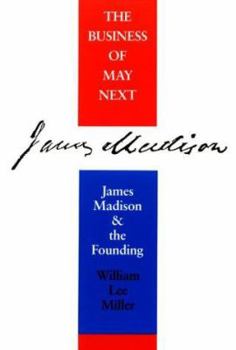Business of May Next: James Madison and the Founding
Select Format
Select Condition 
Book Overview
"Good fortune offered this nation an unusual chance at ideal nation-forming and...some honorable leaders seized that chance," writes William Lee Miller in The Business of May Next, and none among the founders made more of the opportunity than did James Madison, subject of this engaging work. Madison is depicted during the critical years between 178 and 1791, when he was so active in articulating the governmental aims of the fledgling nation that he sometimes found himself in official dialogue with himself. More than simply a historical and biographical account, the book traces Madison's political and theoretical development as a means of illuminating its larger theme, the moral and intellectual underpinnings of the American nation.
Format:Paperback
Language:English
ISBN:0813914906
ISBN13:9780813914909
Release Date:November 1993
Publisher:University of Virginia Press
Length:296 Pages
Weight:1.15 lbs.
Dimensions:0.8" x 6.2" x 8.5"
Grade Range:Postsecondary and higher
Customer Reviews
2 ratings
Understanding Madison's Importance
Published by Thriftbooks.com User , 24 years ago
The Busines of May Next is easily the best book I have ever read on James Madison's intellectual journey from his dismay over the ineffectiveness of the Articles of Confederation to his draft of the Virginia Plan, which was the underlying foundation of our Constitution. The title is taken from a letter Madison wrote in which he discussed the "business" of the upcoming Constitutional Convention (in May of 1789), of which Madison--along with Alexander Hamiltion--was the prime mover. Miller's book expertly and eloquently explores the influences on Madison's thinking, from his reading of David Hume's essays on the ideal conditions for a republic, to his correspondence with Washington, Jefferson and many others in which he fleshed out his ideas of how to turn the weak, ineffectual Articles into a government that had both power and staying power.As Miller points out, Madison's genius was his understanding of human behavior, and his awareness that any government must be shaped in ways that take advantage of the "better angels of our nature," but also (more important) minimize, or at least accommodate, the darker side of our nature. By fashioning a government with limited and shared powers; by holding frequent elections in which the leaders are held accountable; by ensuring that the people possess certain rights that no government can threaten (on pain of being altered or abolished), Madison was the first among equals in the creation of a truly representative government that has lasted more than 200 years and shows no signs of dying out. Miller himself is one of the few (William Manchester is another) historians whose thorough research is matched by his delightful writing style. I have two copies of the book--a hardcopy for reading and a paperback for underlining.
Excellent
Published by Thriftbooks.com User , 28 years ago
This is a very good discussion of Madison's role in the development of the Consitution. Very readabl





